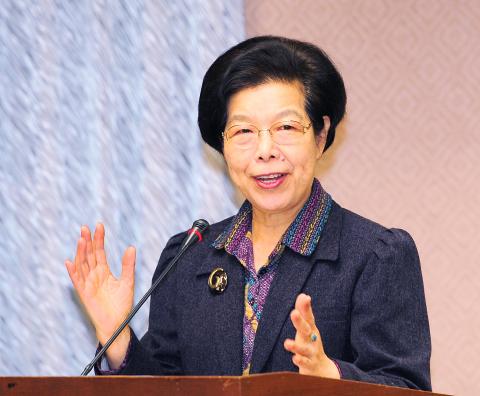President Ma Ying-jeou (馬英九) has nominated Central Election Commission (CEC) Chairperson Chang Po-ya (張博雅) to be president of the Control Yuan, looking to make her the first female head of one of the five branches of the government, local media reported last night.
Ma also nominated former Council of Indigenous Peoples minister Sun Ta-chuan (孫大川) as vice president of the Control Yuan, the government watchdog, local media reports said.
Chang is a veteran politician, having served as interior minister, Chiayi mayor, a legislator and minister of the now-defunct department of health.

Photo: Lo Pei-der, Taipei Times
The 71-year-old was designated CEC chairperson in 2010 and her term is due to expire on Nov. 3 this year.
If approved, Chang’s nomination would dash the renomination hopes of Control Yuan President Wang Chien-shien (王建煊), who has made several controversial remarks during his six-year tenure, such as describing college students who take on part-time work as “very stupid.”
Meanwhile, local media also reported that Wu Jin-lin (伍錦霖) has been promoted from vice president to Examination Yuan president, while Examination Yuan member Kao Yuang-kuang (高永光) has been appointed to succeed him.
A former secretary-general at the Presidential Office and a former deputy secretary-general of the Chinese Nationalist Party (KMT), of which Ma is chairman, Wu has played an important role in Ma’s political career.
Wu was put in charge of formulating strategies for Ma’s first presidential campaign in central and southern Taiwan in 2008. He also campaigned for the president when Ma sought re-election in 2012.
Wu served as Examination Yuan interim president between September and November 2008.
Under the Constitution, the president is entitled to nominate the president and vice president of the Control Yuan and the Examination Yuan.
The nominations have to be approved by the Legislative Yuan.

ACTION PLAN: Taiwan would expand procurement from the US and encourage more companies to invest in the US to deepen bilateral cooperation, Lai said The government would not impose reciprocal tariffs in retaliation against US levies, President William Lai (賴清德) said yesterday, as he announced five strategies to address the issue, including pledging to increase Taiwanese companies’ investments in the US. Lai has in the past few days met with administrative and national security officials, as well as representatives from various industries, to explore countermeasures after US President Donald Trump on Wednesday last week announced a 32 percent duty on Taiwanese imports. In a video released yesterday evening, Lai said that Taiwan would not retaliate against the US with higher tariffs and Taiwanese companies’ commitments to

‘SPECIAL CHANNEL’: Taipei’s most important tasks are to stabilize industries affected by Trump’s trade tariffs and keep negotiations with Washington open, a source said National Security Council Secretary-General Joseph Wu (吳釗燮) arrived in the US for talks with US President Donald Trump’s administration, a source familiar with the matter said on Friday. Wu was leading a delegation for a meeting known as the “special channel,” the Financial Times reported earlier. It marked Trump’s first use of the channel since returning to the White House on Jan. 20. Citing a source familiar with the matter, the Financial Times reported that Minister of Foreign Affairs Lin Chia-lung (林佳龍) was also a part of the delegation. The visit came days after China concluded war games around Taiwan and amid Trump’s

CHIP EXCEPTION: An official said that an exception for Taiwanese semiconductors would have a limited effect, as most are packaged in third nations before being sold The Executive Yuan yesterday decried US President Donald Trump’s 32 percent tariff on Taiwanese goods announced hours earlier as “unfair,” saying it would lodge a representation with Washington. The Cabinet in a statement described the pledged US tariffs, expected to take effect on Wednesday next week, as “deeply unreasonable” and “highly regrettable.” Cabinet spokeswoman Michelle Lee (李慧芝) said that the government would “lodge a solemn representation” with the US Trade Representative and continue negotiating with Washington to “ensure the interests of our nation and industries.” Trump at a news conference in Washington on Wednesday announced a 10 percent baseline tariff on most goods

HELPING HAND: The steering committee of the National Stabilization Fund is expected to hold a meeting to discuss how and when to utilize the fund to help buffer the sell-off The TAIEX plunged 2,065.87 points, or 9.7 percent, to close at 19,232.35 yesterday, the highest single-day percentage loss on record, as investors braced for US President Donald Trump’s tariffs after an extended holiday weekend. Amid the pessimistic atmosphere, 945 listed companies led by large-cap stocks — including Taiwan Semiconductor Manufacturing Co (TSMC, 台積電), Hon Hai Precision Industry Co (鴻海精密) and Largan Precision Co (大立光) — fell by the daily maximum of 10 percent at the close, Taiwan Stock Exchange data showed. The number of listed companies ending limit-down set a new record, the exchange said. The TAIEX plunged by daily maxiumu in just